313 And where is the voice: the transcript reads: ‘& where is voice’.
p. 314 Hesperus: cf. Byron, Don Juan, Canto 4, stanza CVII.
p. 316 warm and erie: i.e. eerie in its first meaning, of fearful or timid.
p. 320 The objects seen: the MS reads ‘seem’, but the syntax and sense require ‘seen’.
p. 330 round the cote: the MS reads ‘coat’.
p. 334 Through this sad non-identity: identity is a recurring subject of Clare’s reflections. Here he recognizes that a secure sense of one’s own identity rests on being recognized by others, and that the breakdown of relationships can render one’s own sense of identity insecure. Cf. Mrs Gaskell: ‘A solitary life cherishes mere fancies until they become manias.’
p. 337 I’ll gaze upon thy bosom’s swell: the transcript offers ‘thy blossom’s well’; the feebleness of the image and of the adverb can serve to alert us to an act of bowdlerizing. I have taken the liberty of offering a conjectural restoration of Clare’s most probable words.
p. 341 And my love lives at the ‘White Hart’: Clare addressed some of his Northampton poems, like letters, to specific young women; in this case, Mary Ludgate, to whom he wrote a loving letter in code, addressing her as his ‘dear daughter’. She lived at the White Hart Inn, Cotton End, and had conceivably drawn a pint for him.
p. 351 She tied up herfewthings: Clare recalls an important part of the traditional agricultural year: young people went to hiring fairs or statutes, in search of employment. Here the girl has reached the term of her contract and is returning home, for a short break, before hiring herself out again.
p. 358 The Winter’s Come: the first line contains the only figure of speech that Clare derived from Northampton’s staple industry — the manufacture of boots and shoes. Clare would have read Dante in the translation by his friend, H. F. Cary: Clare wrote to Cary in October 1832, after Cary had offered him philosophical consolation following the move to Northborough. Burton’s Anatomy of Melancholy enjoyed an enthusiastic revival in the early nineteenth century, largely owing to the advocacy of Charles Lamb.
These stanzas appear in a manuscript of 1850; Clare was still extending, albeit more sporadically, his ‘Prison Amusements’ sequence.
p. 361 ToJohnClare: this poem is dated 10 February 1860, and raises the question: to which John Clare? His son, John, was born 16 June 1826, and would be thirty-three, but Clare no longer reckoned the years.
the new number just laid down: chapmen-men who bought a stock of chapbooks, ballads, broadsides from provincial publishers — hawked them from village to village. One of Clare’s manuscripts was entitled ‘Halfpenny Ballads’. The stock-in-trade of the chapmen was a variety of traditional romances and truncated versions of popular novels. See Geoffrey Summerfield, Fantasy and Reason, Chapter 2, Methuen/Georgia University Press, 1985, and George Deacon, op. cit., pp. 34ff.
GLOSSARY
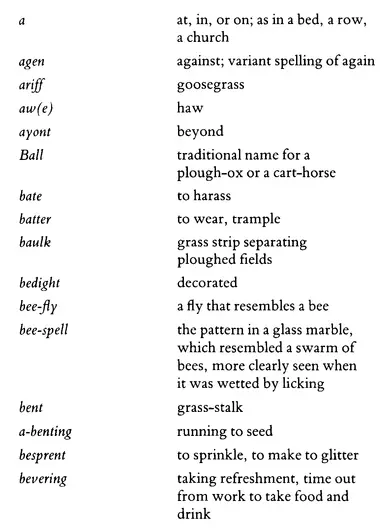
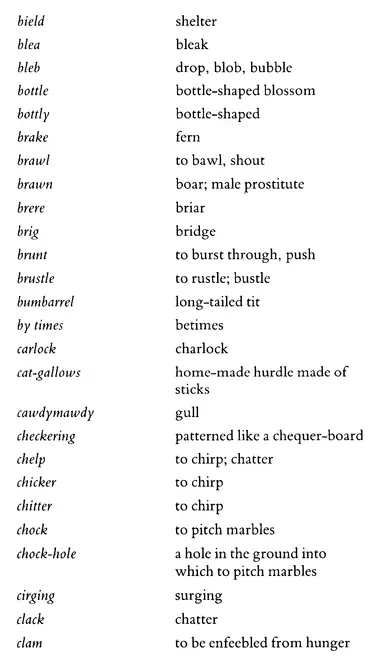
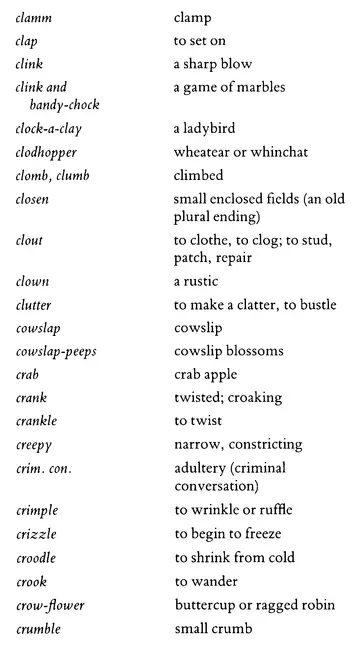
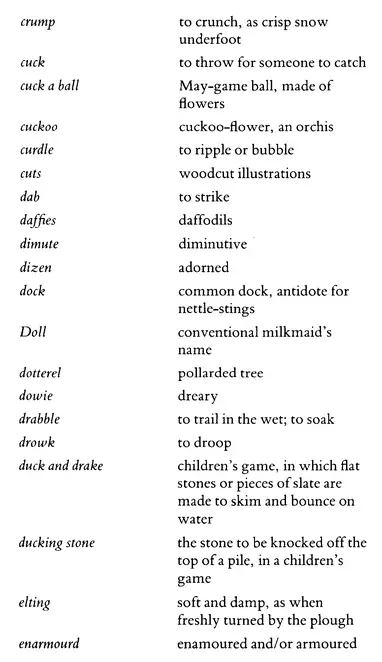
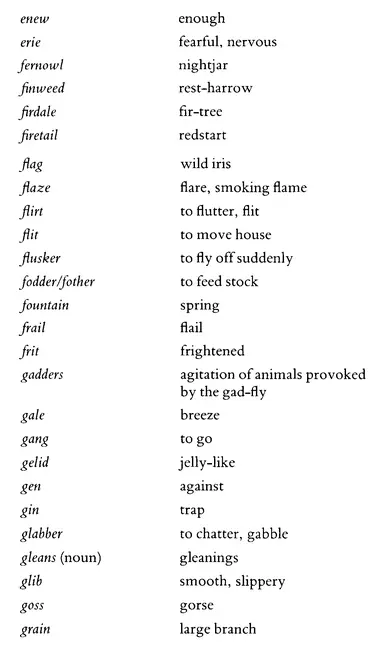
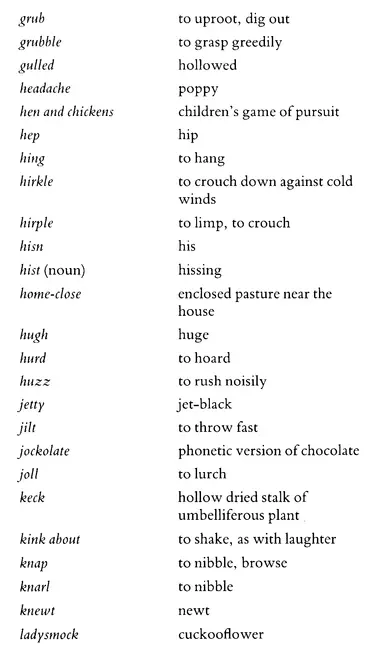
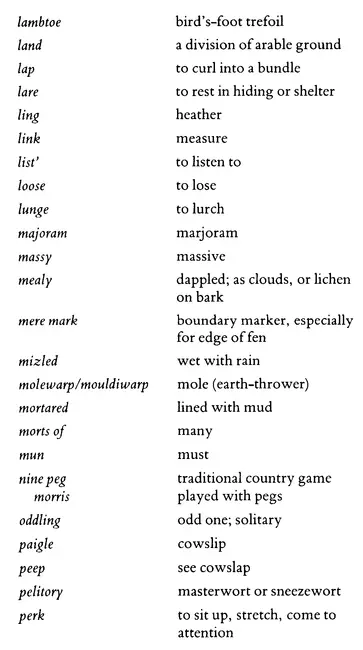
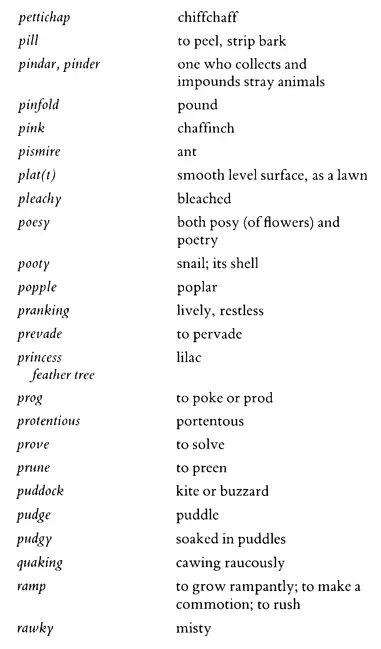
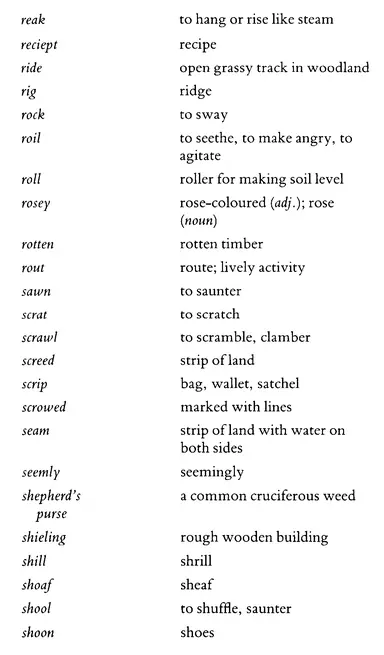
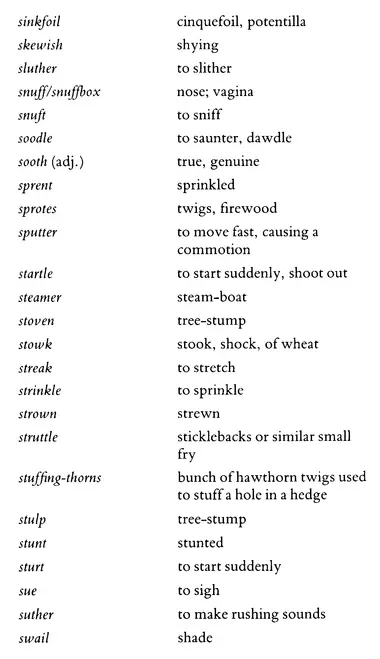
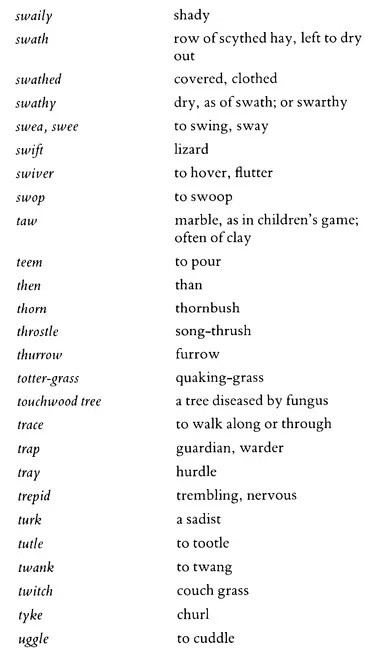

INDEX OF FIRST LINES
Accross the fallow clods at early morn
Ah sure it is a lovely day
Amidst the happiest joy a shade of grief
And in the maple bush there hides the style
And must we part that once so close
Beautiful Sorrow in thy silence thou
Black absence hides upon the past
Come dwell with me
Come early morning with thy mealy grey
Come luscious spring come with thy mossy roots
Darkness came o’er like chaos - and the sun
Darkness like midnight from the sobbing woods
Delicious is a leisure hour
Didknow where to meet thee
Dying gales of sweet even
Eliza now the summer tells
Fair maiden when my love began
Far spread the moorey ground alevel scene
First love will with the heart remain
Free from the cottage comer see how wild
From bank to bank the water roars Like thunder in a storm
Harken that happy shout — the school-house door
He could not die when trees were green
He loved the brook’s soft sound
Her cheeks are like roses
Here’s a health unto thee bonny lassie O
Here’s where Mary loved to be
Hesperus, the day is gone
How fresh the air, the birds how busy now
How oft a summer shower hath started me
How pleasant are the fields to roam and think
How silent comes this gentle wind
Hugh elm thy rifted trunk all notched and scarred
I am - yet whatam, none cares or knows;
I envy e’en the fly its gleams of joy
I feel I am, I only know I am
I hid my love when young while I 352
I long to think of thee in lonely midnight
I lost the love of heaven above
I love at eventide to walk alone
I love it well, o’ercanopied in leaves
I love the fitfull gust that shakes
I love the awthorn well
I love to see the old heath’s withered brake
I never pass a venerable tree
I peeled bits o’ straws andgot switches too
I saw her in my spring’s young choice
I seek her in the shady grove,
I sleep with thee and wake with thee
I think of thee at early day
I went in the fields with the leisure I got, 211
I wish I was where I would be
I wish I was where I would be
I’ll come to thee at eventide
In the cowslip’s peeps I lye
In this cold world without a home
In thy wild garb of other times
Infants’ graves are steps of angels where
It is the evening hour
I’ve left mine own old home of homes
I’ve loved thee Swordy Well and love thee still
I’ve wandered many a weary mile
Just by the wooden brig a bird flew up
Leaves from eternity are simple things
Let us go in the fields love and see the green tree
Little trotty wagtail he went in the rain
Love is a secret
Love lies beyond
Lovely Mary when we parted
Lover of swamps
Maid of Walkherd, meet again
Many are May time is to the meadows coming in
Many are poets — though they use no pen
Midsummer’s breath gives ripeness to the year
Musing beside the crackling fire at night
My old lover left me I knew not for why
No single hour can stand for nought
Now comes the bonny May dancing and skipping
Now evening comes and from the new-laid hedge
Now is past, the happy now
Now swathy summer by rude health embrowned
O cold is the winter day And iron is the ground
O’ come to my arms i‘ the cool o’ the day
O dear to us ever the scenes of our childhood
O for a pleasant book to cheat the sway
O Lord God Almighty How Usefull Art Thou
O Mary dear, three springs have been
O Mary sing thy songs to me
O Mary thou that once made all
O poesy is on the wane
O poesy’s power, thou overpowering sweet
O sigh no more, love, sigh no more
O wert thou in the storm
Old elm that murmured in our chimney top
Old January clad in crispy rime
Old stone pits with veined ivy overhung
Old tree, oblivion doth thy life condemn
On Lolham Brigs in wild and lonely mood
On the rude heath yclad in furze and ling
Pale sunbeams gleam
Petitioners are full of prayers
‘Poets are born’ — and so are whores — the trade is
Poets love nature and themselves are love
Pleased in his loneliness he often lies
Remember dear Mary love cannot deceive
Roaming the little path ‘neath dotterel trees
Sauntering at ease I often love to lean
Say What Is Love - To Live In Vain
She tied up her few things
Spring comes anew and brings each little pledge
Spring cometh in with all her hues and smells
Summer morning is risen
Summer’s pleasures they are gone like to visions every one
Sweet days while God your blessings send
Sweet little minstrel of the sunny summer
Sweet twilight nurse of dews
Sweet chesnuts brown like soleing-leather turn
That summer bird its oft-repeated note
The apple-top’t oak in the old narrow lane
The autumn morning waked by many a gun
The Autumn wind on suthering wings
The badger grunting on his woodland track
The bird cherry’s white in the dews o’ the morning
The birds are gone to bed the cows are still
The Blackbird Has Built In The Pasture Agen
The crib-stock fothered, horses suppered-up
The crow will tumble up and down
The Crow sat on the willow tree
The daisy-button tipped wi’ dew Green like the grass was sleeping
The evening gathers from the gloomy woods
The evening is for love As the morning is for toil
The evening o’er the meadow seems to stoop
The flag-top quivers in the breeze
The floods come o’er the meadow leas
The fly or beetle on their track
The foddering boy along the crumping snows
The frog half-fearful jumps accross the path
The frolicksome wind through the trees and the bushes
The girllove is flesh and blood
The hazel blooms, in the threads of crimson hue
The heaven’s are wrath - the thunder’s rattling peal
The hedgehog hides beneath the rotten hedge
The Larks in the sky love
The martin-cat long-shagged of courage good
The morning comes — the drops of dew
The one delicious green that now prevades
The past it is a majic word
The rawk o’ the Autumn hangs over the woodlands
The rich brown umber hue the oaks unfold
The rolls and harrows lie at rest beside
The Rose Of The World Was Dear Mary To Me
The ruin of a ruin - man of mirth
The rural occupations of the year
The shepherd on his journey heard when nigh
The shepherds and the herding swains
The shepherd’s hut propt by the double ash
The sinken sun is takin’ leave
The skylark mounts up with the mom
The snow falls deep; the Forest lies alone:
The South-west wind, how pleasant in the face
The spring is come forth but no spring is for me
The spring may forget that he reigns in the sky
The spring returns, the pewet screams
The stepping-stones that stride the meadow streams
The summer she is gone her book is shut
The sun has gone down with a veil on her brow
The sun had grown on lessening day
The sun had stooped his westward clouds to win
The sun looks downin such a mellow light
The sunshine bathes in clouds of many hues
The sweet spring now is coming
The tame hedge-sparrow in its russet dress
The thistledown’s flying Though the winds are all still
The weary woodman rocking home beneath
The wind waves o’er the meadows green
The wood-anemonie through dead oak-leaves
The woodland swamps with mosses varified
There is a day a dreadfull day
There is a feeling nought can calm
There is a wild and beautiful neglect
There lies a sultry lusciousness around
There’s a little odd house by the side of the Lane
There’s more then music in this early wind
There’s pleasure on the pasture lea
These childem of the sun which summer brings
They ne’er read the heart
This visionary theme is thine
Thou’rt dearest to my bosom
Thou hermit haunter of the lonely glen
Thou tiney loiterer on the barley’s beard
’Tis autumn now and nature’s scenes
’Tis evening, the black snail has got on his track
’Tis haytime and the red-complexioned sun
‘Tis spring thy love ’tis spring
’Tis winter plain the images around
True poesy is not in words
Twilight meek nurse of dews
Up this green woodland ride let’s softly rove
Upon the collar of a hugh old oak
We never know the sweets o’ joy
Wearied with his lonely walk
Welcome sweet eve thy gently sloping sky
Well, honest John, how far you now at home?
Well, in my many walks I rarely found
What a night the wind howls hisses and but stops
What is song’s eternity?
What time the wheat field tinges rusty brown
When life’s tempests blow high
Where is the heart thou once hast won
Where last year’s leaves and weeds decay
Where the ash-tree weaves
Who hath not felt the influence that so calms
Why is the cuckoo’s melody preferred
Wilt thou go with me sweet maid
Wing-winnowing lark with speckled breast
Winter is come in earnest and the snow
Woman had we never met
Would’st thou but know where Nature clings
Youth has no fear ofby no cloudy days annoyed
INDEX OF TITLES
And Must We Part?
And only o’er the heaths to ramble ...
Autumn: I love the fitfull gusts ...
Autumn Morning
Autumn: The thistledown’s flying ...
Autumn Wind, The
Badger, The
Ballad: Fair maiden ...
Ballad - Fragment: O Lord God Almighty
Ballad: O sigh no more, love ...
Ballad: The spring returns ...
Ballad: Where is the heart ...
Beans in Blossom
Bird’s Nests
Childhood
Childhood: O dear to us ever the scenes of our childhood ...
Clock-a-Clay
Cottage Fears
Crab Tree, The
Crow Sat on the Willow, The
Crows in Spring
daisy-button tipp’d wi’ dew ... , The
Decay
Decay
Dedication to Mary
Dying Child, The
Early Images
Emmonsales Heath
Emmonsails Heath in Winter
Eternity of Nature, The
evening is for love ... , The
Evening Pastime
Evening Schoolboys
Evening: ’Tis evening, the black snail has got on his track ...
Fallen Elm, The
Fern Owl’s Nest, The
Flood, The
Field-Cricket
First Love’s Recollections
First Sight of Spring
Flitting, The
Flowers shall hang upon the palls
Foddering Boy, The
Fox, The
Frightened Ploughman, The
Gipsy Camp, The
Graves of Infants
Hail Storm in June, The
Happiness of Evening
Hares at Play
Haymaking
Heat of Noon, The
Hedgehog, The
Hedge-Sparrow
Her Love is All to Me
Hesperus
Hollow Tree, The
Home Pictures in May
How hot the sun rushes ...
Humble Bee, The
I Am
I look on the past and I dread the tomorrow
I love thee nature with a boundless love ...
I’ve ran the furlongs to thy door ...
Idle Hour, An
Insects
Invitation, The
Invite to Eternity, An
Lament of Swordy Well, The
Left in the world alone ...
Little Trotty Wagtail
Lord hear my prayer when trouble glooms
Love: Love is a secret ...
Maid of Walkherd, meet again ...
Martin, The
Mary: A Ballad: The skylark mounts up ...
Mary: it is the evening hour...
Meadow Grass, The
Midsummer
Milking Hour, The
Mist in the Meadows
Moorhen’s Nest, The
Mores, The
Morning
Morning Walk, A
Morning Wind, The
Nigh Leopard’s Hill stand All-n’s hells ...
Night Wind
Nightingale’s Nest, The
Nothingness of Life
Now is Past
Nutters
Nutting
O’ Come to My Arms
O could I be as I have been ...
Obscurity
Old Man’s Song, The
Pastoral Poesy
Peasant Poet, The
Pettichap’s Nest, The
Pewit’s Nest, The
Pleasant Places
Pleasant Spots
Poesy a-Maying
Prison Amusements, or Child Harold
Ballad
Song
Song
Song
Written in a Thunderstorm July 15th 1841
Song
Song
Ballad
Song
Song
Song
Song
Song
Song
Song
Song
Song
Song
Song
Song
Song
Song
Ballad
Ballad
Song
Part of Prison Amusements, or Child Harold, continued
Temple of Minerva
Song
Spring
Last Day
Song
Song
Song
Song
To Sorrow
Song
To Awthorn
Song
Song
Spring
Twilight
Song
Song
March Violet
Raven’s Nest, The
Rawk o’ the Autumn, The
Remember dear Mary
Remembrances
Robin’s Nest, The
Round Oak, The
Part of The Sale of Old Wigs and Sundries, or Don Juan
Song
Sand Martin
Shepherd Boy, The
Shepherd Boy, The
Shepherd’s Fire, The
Shepherd’s Hut, The
Shepherd’s Tree, The
Signs of Winter
Sky Lark, The
Snow Storm
Snow Storm
Sonnet: The flag-top quivers in the breeze ...
Song: The girllove is flesh and blood ...
Song: How silent comes this gentle wind ...
Song: I hid my love when young...
Song: I’ll come to thee at eventide ...
Song: I peeled bits o’ straws ...
Song: I seek her in the shady grove ...
Song: I wish I was where I would be ...
Song: Love lives beyond ...
Song: My old lover left me ...
Song: O wert thou in the storm
Song: She tied up her few things ...
Song: Where the ash-tree weaves ...
Song: The wind waves o’er the meadows green ...
Song’s Eternity
Sonnet: I feel I am ...
Sonnet: Poets love nature ...
Sport in the Meadows
Spring comes and it is May ...
Spring Morning, A
Stanzas: Black absence hides upon the past ...
Stanzas: The spring is come forth ...
Stanzas: Would’st thou but know ...
Stepping-Stones
Stray Walks
Summer Evening
Summer Evening
Summer Gone, The
Summer Happiness
Summer Images
Summer Moods
Summer Shower, The
Sunday with Shepherds and Herdboys, A
Sunset
Sweetest Woman There, The
Swordy Well
The Enthusiast: A Daydream in Summer
’Tis Martinmass from rig to rig ...
To John Clare
To a Lark singing in Winter
To Mary: I sleep with thee and wake with thee ...
To the Snipe
Twilight
Valentine to Mary
Village Boy, The
Vision, A
Wheat Ripening, The
Wild Bees
Wind, The
Winter
Winter Evening
Winter Fields
Winter’s Come, The
Woman Had We Never Met
Wood Pictures in Spring
Wood Pictures in Summer
Wood Pictures in Winter
Wood Rides
Wood-Anemonie
Woodman, The
Woodpigeon’s Nest, The
Wren, The
Written in Prison
Wryneck’s Nest, The
Yellowhammer’s Nest, The
.
1 comment